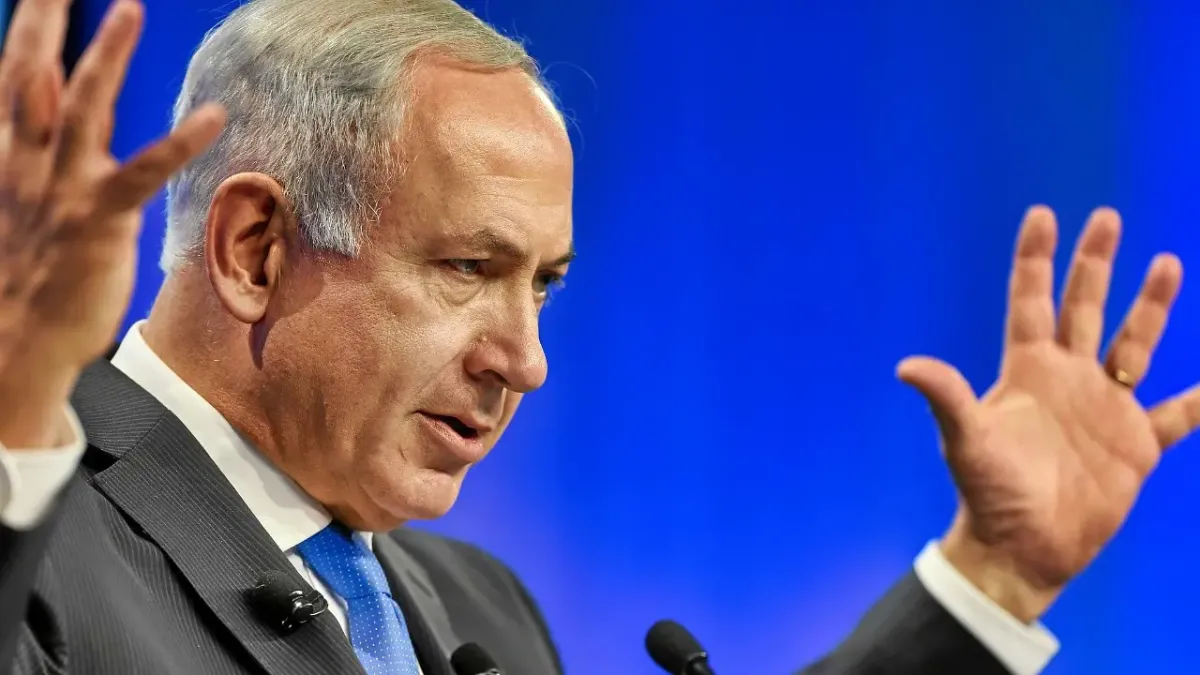Netanyahu Faces New Scandal Amid Intelligence Leak and Escalating Security Crisis

TL;DR
Israeli Prime Minister Benjamin Netanyahu faces a new scandal as a close aide is arrested for allegedly leaking classified intelligence, reportedly influencing public opinion on Gaza strategies. This controversy adds to Netanyahu’s ongoing corruption trial, where he faces charges of bribery, fraud, and breach of trust. Amid recent security failures, notably the October 7 Hamas attacks, the intelligence scandal and Netanyahu’s hardline Gaza stance have fueled speculation over whether he is diverting attention from his legal issues. As Israel braces for continued threats, Netanyahu’s balancing act between governance and personal survival remains under intense scrutiny.
Check out Prime Rogue Inc's Video on Netanyahu's legal challenge here
Netanyahu's Legal Battles and the New Intelligence Scandal
Israeli Prime Minister Benjamin Netanyahu finds himself at the center of a fresh scandal following the arrest of a close aide accused of leaking classified information. This arrest has added a new layer to Netanyahu’s ongoing legal challenges, drawing renewed scrutiny to his administration’s handling of security matters amid escalating tensions with Hamas in Gaza and increasing Iranian threats. While Netanyahu has denied any involvement, the intelligence leak has sparked speculation about his knowledge of the breach and whether it served to influence Israeli public opinion.
Since 2020, Netanyahu has faced a series of corruption charges—known as Case 1000, Case 2000, and Case 4000—involving bribery, breach of trust, and fraud. These cases collectively allege that Netanyahu provided regulatory favors to media moguls in exchange for positive press coverage and accepted lavish gifts from wealthy associates. Despite these allegations, Netanyahu continues to lead Israel, taking a hardline stance on defense while facing a divided public that is increasingly critical of his actions
The Intelligence Leak and Its Implications
The recent scandal erupted when Israeli authorities arrested Netanyahu's aide, suspected of leaking classified information to the German tabloid Bild. This leak reportedly included sensitive details about Hamas’ strategy in hostage negotiations, raising questions about the impact of this disclosure on national security. Kan News reported that the aide, despite lacking formal security clearance, was privy to highly classified discussions within Netanyahu’s inner circle since the onset of the Israel-Gaza conflict in October. The aide’s alleged breach has led to a broader investigation involving Shin Bet, the IDF, and the Israeli police, with officials worried that the leak could compromise Israel's strategic operations in Gaza.
This scandal could have major repercussions for Netanyahu’s administration, especially considering the growing rift between his office and Israel’s defense and intelligence agencies. Tensions between Netanyahu and the IDF have escalated since the October 7 Hamas attacks, which exposed significant lapses in Israel’s security infrastructure. The intelligence leak only amplifies these tensions, adding to a pattern of mistrust between Netanyahu and key security players
A Series of Scandals: Netanyahu's Long-Running Legal Troubles
Before this latest scandal, Netanyahu was already navigating a complex web of legal issues. His corruption cases, now entering a critical phase, have cast a long shadow over his political career. Netanyahu is accused of exploiting his position for personal gain in three high-profile cases:
- Case 1000: Involves allegations that Netanyahu and his family received luxury gifts, including cigars and champagne, from billionaire benefactors in exchange for political favors.
- Case 2000: Netanyahu allegedly engaged in negotiations with the owner of Yedioth Ahronoth, a major Israeli newspaper, offering regulatory benefits in return for favorable media coverage.
- Case 4000: Perhaps the most severe, this case accuses Netanyahu of advancing regulatory benefits to telecommunications giant Bezeq in exchange for positive coverage on Walla News, a Bezeq-owned outlet.
These cases have collectively kept Netanyahu entangled in court proceedings, with the next critical phase of his trial resuming in December 2024. As part of his defense, Netanyahu is expected to testify—a rare and significant event for an Israeli prime minister facing criminal charges. His testimony could either vindicate him or further entrench public skepticism regarding his fitness to lead
October 7 and the Security Crisis
Netanyahu’s leadership has been further tested by the October 7 attacks by Hamas, which caught Israel’s defenses off guard and led to widespread casualties. In the aftermath, Netanyahu vowed to dismantle Hamas, launching extensive airstrikes on Gaza. However, the attacks revealed vulnerabilities in Israel’s preparedness, sparking criticism of Netanyahu’s administration. Observers have pointed to these gaps as evidence of a leadership more focused on political survival than on ensuring robust security infrastructure.
The October 7 attacks not only exposed strategic failures but also fueled internal criticism, with defense officials and the public questioning Netanyahu’s judgment and priorities. The recent intelligence scandal compounds these concerns, as Israelis worry about the potential for compromised security and the possibility that Netanyahu’s political maneuvers may have undermined national interests at a critical time.
Wagging the Dog? A Potentially Calculated Distraction
Netanyahu’s hardline stance on security, combined with his insistence on continued military campaigns in Gaza, has led some analysts to speculate that he may be employing a “wag the dog” strategy—using military crises to divert attention from his domestic legal troubles. As the leader battles corruption charges, questions about whether his hardline approach in Gaza and his handling of the intelligence leak are aimed at consolidating support remain a subject of intense debate.
The notion of Netanyahu leveraging external threats to solidify his political standing is not new. Throughout his career, Netanyahu has positioned himself as a defender of Israeli security, often invoking existential threats to rally public support. However, critics argue that his current approach—escalating military engagements while facing serious accusations—may indicate a strategic choice to divert scrutiny from his legal battles and shift public attention toward nationalistic solidarity.
Deepening Divisions and Public Discontent
The impact of these scandals on Israeli society is significant. With public trust in government institutions waning, Netanyahu’s legal and political challenges have deepened divisions across Israel’s political spectrum. Many Israelis feel conflicted between their support for Israel’s right to defend itself and concerns over Netanyahu’s motivations. The country has already seen a wave of protests against his proposed judicial reforms, which critics argue are designed to shield him from accountability. For many, these reforms symbolize an attempt to weaken Israel’s democratic checks and balances, fueling public skepticism about Netanyahu’s true intentions.
With the corruption trial set to resume, Netanyahu’s political fate hangs in the balance. The intelligence leak scandal, combined with his hardline approach in Gaza, will likely intensify scrutiny as he prepares to take the stand. If convicted, he faces a potential prison sentence—an outcome that could reshape Israeli politics and prompt a shift in leadership amid ongoing regional security concerns.
The Road Ahead: Netanyahu's Balancing Act
As Netanyahu navigates these intersecting crises, his ability to balance Israel’s security needs with his own political survival remains uncertain. The intelligence leak and corruption trials highlight a leader under pressure, facing not only external threats but also internal fractures within his administration. Whether Netanyahu can maintain his grip on power while managing these crises is an open question that has left Israelis and international observers watching closely.
The coming months will be pivotal. If further evidence emerges linking Netanyahu’s office to the intelligence leak, or if his trial exposes new details, his hold on power could weaken considerably. Conversely, if he successfully navigates these challenges, Netanyahu may emerge as a resilient, albeit controversial, figure in Israeli politics.
Conclusion: A Leader on Shaky Ground
The recent intelligence scandal encapsulates the high-stakes environment surrounding Netanyahu, a leader whose legacy is entwined with both historic achievements and deep controversies. As Israel confronts pressing security challenges, Netanyahu’s legal entanglements and political decisions continue to stir debate. Whether these choices reflect a genuine commitment to Israel’s security or are calculated distractions remains ambiguous. With his corruption trial and escalating security risks, Netanyahu’s next moves will shape not only his future but also the trajectory of Israel’s governance in the face of unprecedented challenges.
Image Courtesy Creative Commons
